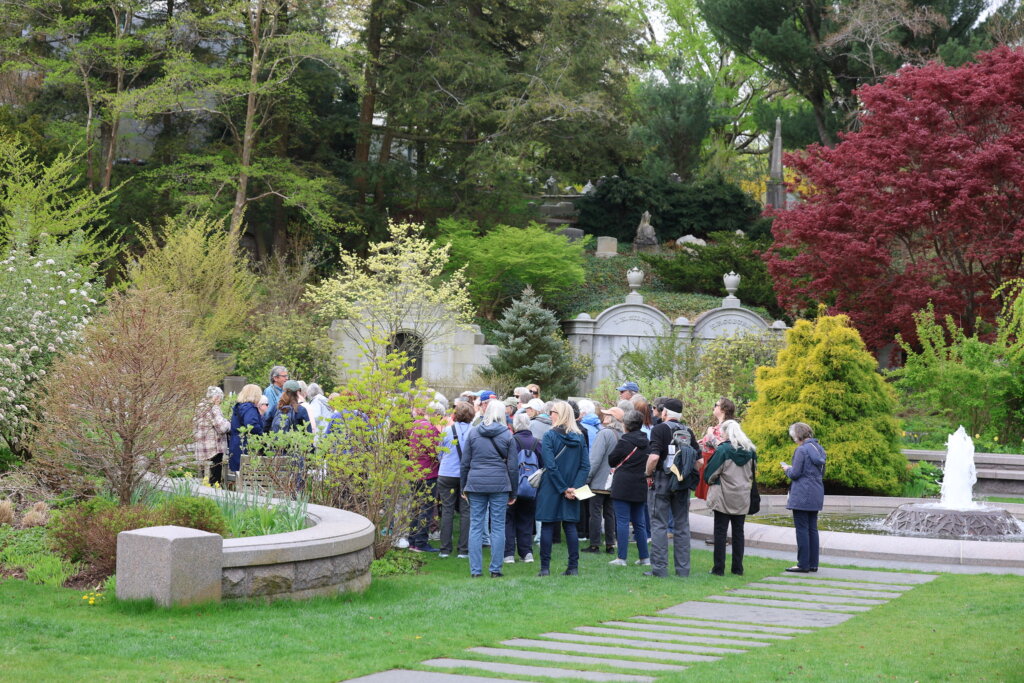The Oak Circle

The Oak Circle was established to honor those who choose to include Mount Auburn in their will and/or estate planning. Members enjoy a variety of benefits in gratitude for their generosity, such as invitations to private receptions, recognition in the Annual Report, and more.
Naming the Friends of Mount Auburn Cemetery* in your will and/or estate plan is a meaningful way to make an impactful contribution to this treasured organization.
*The Friends of Mount Auburn Cemetery is the official name of our 501(c)(3) non-profit organization that assists in the conservation of the Cemetery’s natural beauty and increases public awareness of its historic and natural resources. Be sure to include our full name—not just “Mount Auburn”—in your will or estate planning!

How You Benefit
- Planned gifts come out of your assets at the time of your death and therefore do not diminish your current income.
- You may alter your bequest or trust designation at any time.
- Your bequest or trust designation is entirely free from federal estate taxes, whereas if it were left to an individual, a significant amount might go to federal estate taxes.
- You receive immediate benefits as a member of the Oak Circle, such as invitations to private receptions, recognition in the Annual Report, and the personal satisfaction of supporting a place you love.
WAYS TO GIVE
BEQUESTS
- Make a lasting impact by naming the Friends of Mount Auburn Cemetery in your bequest. A bequest is a gift made to the Friends of Mount Auburn Cemetery through your will or trust at the time of your passing, and it costs you nothing in your lifetime.
Making an unrestricted bequest is an extraordinary demonstration of your support, because it allows Mount Auburn to allocate your generous gift to support the many aspects of this place of remarkable beauty, including the care of our horticultural collection, preservation and conservation, enhancements to the landscape, educational and public programming, and protection of wildlife habitat.
If you prefer, your bequest can be designated (restricted), and the bequest language can specify how your gift will be used by Mount Auburn upon receipt.
You can review further bequest language and details with your estate planning professional.
TYPES OF BEQUESTS
- Types of bequests include:
- Cash Bequest
Mount Auburn receives a specific dollar amount from your estate. - Residuary Bequest
Mount Auburn receives all or a percentage of the remainder of your estate after the payment of any specific bequests and expenses. - Retirement Plan
Mount Auburn is designated as a beneficiary of the remainder of your IRA or qualified pension. - Life Insurance
Mount Auburn is designated as a beneficiary or owner of your life insurance policy.
TRUSTS, ANNUITIES, AND MORE
- In addition to bequests, other types of planned gifts include:
- IRA Distributions
- Pooled Income Fund
- Charitable Remainder Unitrust
- Charitable Remainder Annuity Trust
- (Deferred)Charitable Gift Annuities
- Charitable Lead Trust
- Gift of Residence or Farm
SAMPLE BEQUEST LANGUAGE
To review with your estate planning professional
The following language in your will would create such a gift:
“I give the sum of ______________dollars ($___________) [or ____________% of my estate] [or description of securities or other property] to the Friends of Mount Auburn Cemetery, a federally tax-exempt 501(c)(3) with offices at 580 Mount Auburn Street, Cambridge, MA 02138. This gift is unrestricted [or a specific designation].
Our Commitment to Our Donors:
We will not sell, share, or trade our donors’ names or personal information with any other entity, nor send mailings to our donors on behalf of other organizations.
This policy applies to all information received by The Friends of Mount Auburn, both online and offline, on any Platform (“Platform” includes Mount Auburn Cemetery’s website and mobile applications), as well as any electronic, written, or oral communications.
To the extent any donations are processed through a third-party service provider, our donors’ information will only be used for purposes necessary to process the donation.
